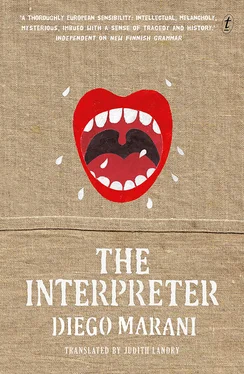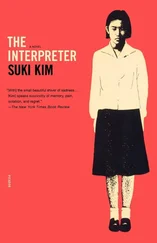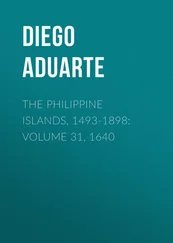Klaipeda is a white city which rises sharply out of the sand, opening up at the sea’s edge into a mesh of straight roads, with a narrow spit of land in front of it which then broadens out to the south, trapping a branch of the sea; and that imprisoned sea looks somehow solidified there among the sands; it has a dead gleam to it, revealing its nakedness, the scaly skin of its depths, the strips of tiny shells which run across it like the exhausted veins of some former seam of precious metal. Two of the best rooms in the most luxurious hotel in town awaited us; the vast expanse of open sea visible through the light-filled windows gave me a sense of weariness. I glanced at my rucksack on the bed, at the new clothes Burke had bought for me, and felt myself doubly a prisoner. My benefactor, on the other hand, was clearly ever more exhilarated by the prospect of the chase; that night at dinner he ordered champagne to celebrate our undertaking.
‘So where shall we begin, Mr. Bellamy? It’s you who must now take over the reins!’ he said excitedly, raising his foaming glass.
We signed up for an intensive course in Lithuanian, put on in Klaipeda by the University of Vilnius. My heart was beating hard as we entered the lecture hall on the ground floor of a small building by the sea; an usher was arranging the seats and laying green folders on the desks. The first row was occupied by a group of silent Africans, all wearing tracksuits and peering around with a bewildered air. Burke and I took our places at the back of the hall, both of us with our eyes on the main door.
‘Have you ever attended a course in a foreign language before, Mr Burke?’ I asked him as I leafed through the folder.
‘Only a bit of business English. Languages have never been my forte. I feel a bit of a clown when I try to speak English; I fear that no one is going to take me seriously. It reminds me of when I was a child and would put on my mother’s clothes as a joke, and look at myself in the mirror and shudder.’
‘You’ll see — you’re bound to learn something even without trying!’ I told him kindly, feeling myself to be something of an authority on the subject.
A group of boys now sauntered in, with a listless air about them; they sat down in front of us and immediately took out their mobile phones. Shortly afterwards two stiff-looking women appeared in the doorway, looking as if they knew it all; then four gaudily dressed Asian men drifted in, one after the other, with businesslike-looking rucksacks from which they extracted mineral water bottles, coloured pens and large exercise books which they laid out neatly on their desks. The last person to come through the door, with a confident, bouncing step, was the teacher herself, a portly middle-aged woman with red hair and clear skin; she sat down heavily at the teacher’s desk, slipped off her shoes and started calling out our names, peering at us from over her glasses and flaring her nostrils, as though she hoped that this would keep them in place. She handed out sheets of paper with various illustrations, and started off by having us pronounce short sentences and ask each other questions; we had to look at the images and link them to one of the words that she was repeating. Burke looked somewhat out of his depth; he made matters worse for himself by trying to guess his question in advance.
‘Mr Bellamy, are you sure that all this is necessary for our purposes?’ he whispered to me.
‘I don’t know, Mr Burke. But if the interpreter has indeed been through Klaipeda, it will certainly have been to learn Lithuanian. Just be patient, something will come of it, you’ll see.’
When we got back to the hotel that first afternoon we were hungry and exhausted; after a bite to eat, I lay down on the bed and slept till evening, while Burke doggedly did his homework.
‘I can’t help myself, Mr Bellamy — I have to succeed, even in this. Klaus Burke is doomed to excel, he has to come first. You’ll see — I’ll get top marks!’
Klaipeda was a soporific place. The leaden expanse of sea gave me a feeling of security; I gave myself over to its protective embrace, but somewhere inside me lurked the feeling that its placid presence might conceal some hidden threat. In the quiet afternoons when I was asleep, with the flat, cold light coming in through the windows, I would dream that the sea too would come in and lap round the foot of my bed. I would wake up with a start, seized by an irrational fear of drowning. At that dead hour of the day, streets and houses seemed on the point of fading away into nothingness, becoming incorporeal. Towards evening the wind would get up, blowing in from the open sea, setting flags and sails snapping; the surface of the water would shatter into sharp little dark waves, which would come to shore as though they were made of oil, without tang or foam. The light, too, would change: the air would become tinged with yellow, things would lose further definition and dissolve into a quivering mirage. The sand would be whipped up from the beach and spin around in the wind, to land on pavements, cars, balconies, café awnings, beating against windows, bleaching the leaves on the trees. It was as though the whole city were about to be slowly engulfed under one vast sand dune and was patiently accepting its fate. Dusk was already gathering when I went down into the foyer, to find Burke poring over his books.
‘Mr Bellamy, did you know that Lithuanian is one of Europe’s oldest languages, the last remains of the time when the Baltic and Slav languages merged? It seems that Lithuanian is the language closest to that of the Indo-Europeans. Apparently linguists regard it as being directly related to Hittite!’ he said excitedly, pointing to the thick volume he’d got from the local library.
‘That shows we’re on the right track,’ I answered, still half-asleep, then flopped down onto the chair next to him.
After a week, we decided to go our separate ways; Burke would carry on with the course and I would snoop around town. I also went to the town library and looked through the list of who had borrowed what; I hung around in the reading room of the foreign languages section to see who came in and out; I struck up conversations with the librarians in search of the slightest clue that might confirm the interpreter’s presence in the place. I checked the hotels, giving princely tips to the porters so that they’d give me the names of all the foreigners who’d stayed there over the previous month, but all to no avail. The course ended, Burke passed the exam for beginners’ Lithuanian with flying colours, but there was still no sign of the interpreter. We made one last attempt by putting an advert in a local paper, asking for a simultaneous interpreter whose mother tongue was Lithuanian but who would be working in a combination of French, German and Lithuanian. On the day it appeared in the Nasza Gazeta we stayed in the hotel from dawn to dusk, vainly awaiting a call.
That night I slept very fitfully; I had the feeling I was suffocating, and opened the windows several times to air the room. The sky was dark and starless; a heavy mist was advancing slowly over the sea, spreading into the streets and covering everything with what looked like heavy dew. Towards dawn, a huge cruise ship sailed silently past the town and berthed in the harbour at the end of the bay, the thousand lights of its decks reflected brokenly at the water’s edge, sending a watery dazzle over the walls of my room. I went back to bed and, after much tossing and turning, fell into a troubled sleep. I thought I heard someone fiddling with the handle of the door, and tried to arouse myself from my drowsiness to go and check, but then decided it was just another of my hallucinations and went back to sleep. The dawn light was at last filtering in through the shadows of my tousled sheets, my head ached, my eyes were burning, my breathing was heavy and laboured. I decided to get dressed and go and get a breath of air. The hotel was still sunk in sleep; the lift was standing empty at the top floor, its light falling gloomily on the wall. I eavesdropped outside Burke’s door and was about to knock, but decided not to wake him and took the stairs. The restaurant was still in darkness, but the foyer smelled of smoke and liquor. I breathed in the damp, salty outside air with a sense of relief, then crossed the road and went to the jetty where the cruise ship was moored. The funnels were still smoking, and deep in the depths of its iron hulk I could hear distant engines throbbing. A lone lorry was shunting around, its headlamps slicing through the violet air; a few shivering passengers were already on the deck of the cruise ship, watching the outline of the city gradually emerging from the mist. But suddenly, rather than clearing, it became thicker; a salty wind blew in from the sea, and the city was enveloped in ragged spray. I retraced my steps and went absent-mindedly down to the beach rather than back to the hotel. I could hear the waves lapping gently on the shore; I went down the steps and let my feet sink into the sand. In the distance I could just make out the vague outline of the landing stages at the tourist harbour; rather than floating, the boats rose out of the glassy water as though they were somehow attached to the sea floor, their masts oozing plump drops which fell almost silently onto the deck floor. I walked down to the waterline and stamped my feet in the wake of a lingering wave, sinking my stick into the sand to see how firm it was and leaving deep, soft footprints, then watching them disappear as the water swept over them. It was then that I saw them, like a mirage: a few metres from the shore, half-sunk in a muddy pool, lay dozens of black narwhals, their spiral tusks pointing towards the sky. Some were twitching their tails, others lay there motionless, as though dead. I left my shoes on the sand and waded towards them, thigh-deep in water. In the meantime, other people too had become aware of their mysterious presence, and were running in the same direction. Now I was standing right by their huge, wrinkled, shell-encrusted bodies. They did not seem at all alarmed: they looked at me sadly with their moist eyes, moving their upper jaws set, like a nose, with their single pointed tusk. A silent crowd had gathered on the shore, but few people actually approached the creatures. One of those who did was an elderly man with a thin red beard, who was wearing waders; he was considering the scene with a sorrowful air.
Читать дальше












